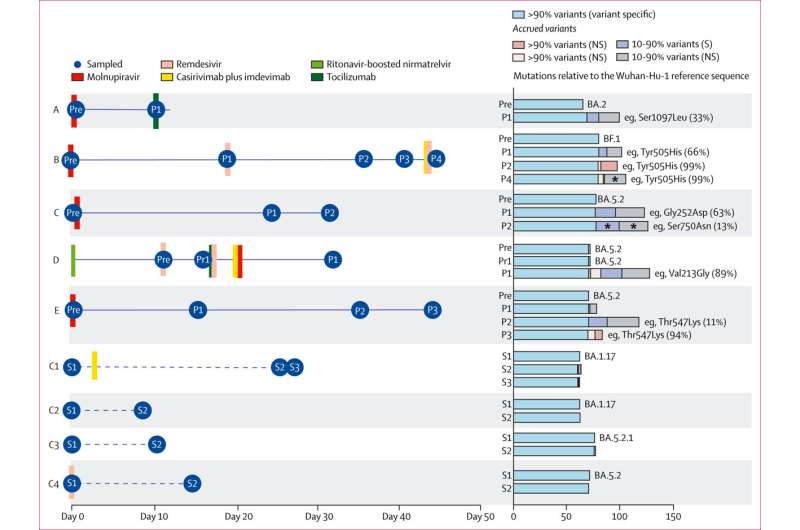This article has been reviewed according to Science X's editorial process and policies. Editors have highlighted the following attributes while ensuring the content's credibility:
fact-checked
peer-reviewed publication
trusted source
proofread
Study uncovers consequences of molnupiravir use to treat COVID-19

A collaboration between the University of Tasmania and Royal Hobart Hospital Pathology has revealed the consequences of using molnupiravir to treat COVID-19.
Published in The Lancet Microbe, the study investigated how molnupiravir affects the virus in a group of patients with prolonged infection due to weakened immune systems.
Molnupiravir, an antiviral medication used to treat COVID-19, prevents virus replication by inducing mutations in the virus genome. It was one of the first available antiviral medications and has been used in the treatment of COVID-19 in Australia for those at risk of severe disease.
Today, molnupiravir remains available for use as a second-line treatment in individuals who are unable to be treated with alternative agents.
In the study, researchers closely monitored the COVID-19 genetic sequences of nine patients with persistent infections; five received molnupiravir treatment, while the remaining four did not.
Patients treated with the drug rapidly accumulated hundreds of new mutations across the virus genome, including the spike protein targeted by vaccines, even after the treatment had stopped.
Even 40 days after treatment, mutations continued to develop, raising concerns about the potential transmission of mutated viruses.
Lead author and University of Tasmania School of Natural Sciences research associate Dr. Nick Fountain-Jones highlighted the implications of the findings.
"Our research underscores the urgent need for a cautious approach in the use of molnupiravir, particularly in immunocompromised patients," Dr. Fountain-Jones said.
"Given the prolonged nature of SARS-CoV-2 infections in such patients, understanding the impact of treatment on viral evolution is vital for anticipating new variants."
Dr. Fountain-Jones warned of the broader implications of widespread molnupiravir use.
"We are witnessing the emergence of COVID variants with mutational signatures aligned with molnupiravir use. These mutations have the potential to pave the way for the next wave of the pandemic," Dr. Fountain-Jones said.
Senior author and director of microbiology and infectious diseases at the Royal Hobart Hospital, Associate Professor Lou Cooley, said the findings had since been confirmed by other groups internationally.
"This project was one of the first international studies to highlight potential issues with this type of antiviral therapy within a clinical setting," Associate Professor Cooley said.
"The paper is the first product of an important collaboration between clinician and scientist researchers at RHH Pathology and the University of Tasmania, that combined the power of Next Generation Sequencing and mathematical modeling to advance health research in Tasmania."
More information: Nicholas M Fountain-Jones et al, Effect of molnupiravir on SARS-CoV-2 evolution in immunocompromised patients: a retrospective observational study, The Lancet Microbe (2024). DOI: 10.1016/S2666-5247(23)00393-2



















